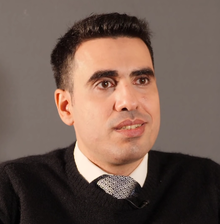You can help expand this article with text translated from
the corresponding article in French. (September 2023) Click [show] for important translation instructions.
|
Idriss Aberkane | |
|---|---|
 | |
| Born | Idriss Jamil Aberkane May 23, 1986 Pithiviers, France |
| Nationality | French |
| Education | University of Strasbourg
University Paris-Sud University Paris-Descartes |
| Occupation(s) | Public speaker, essayist, YouTuber |
| Board member of | Muslim Scouts of France |
| Website | http://idrissaberkane.org/ |
Idriss Jamil Aberkane (born May 23, 1986) [1] [2] is a French public speaker and essayist. Known for his writings and lectures on personal development, he published a particularly successful essay in 2016, titled Free up your mind!. However, he was the subject of criticism as he was accused of artificially inflating his resume and of using his three doctoral diplomas ( Ph.Ds) to talk about sciences that are not in his areas of expertise. [3] The scientific accuracy of some of his statements and publications was questioned by other researchers. His support for Didier Raoult, the famous French epidemiologist, and his questioning of the reliability of COVID-19 vaccines, in particular Pfizer's, has caused him to be classified as an anti-vax conspiracist. [3]
Early life and education
His parents taught mathematics at a teachers' college, [4] and as a boy he participated in the Muslim Scouts of France, of which his father was one of the first leaders; he has cited his participation in the scouts as an inspiration for his life's work. [5]
Aberkane has obtained three doctorate degrees in management science from Paris Saclay whose plagiarism is proven, [6] in comparative literature from University of Strasbourg, and in diplomacy from Centre d'Études Diplomatiques et Stratégiques. [4] He became known in France for his lectures and essays about neurosciences, social psychology, gamification and their applications in education and business. [4] A profile in the French newspaper Le Monde described his advocacy for these applications as "a bit North American, where science, popularization, morality, personal narrative and advice intertwine". [4]
Criticisms
He has been criticized for his lack of rigor and fabricating some parts of his resume, [7] [8]. Aberkane has since then published a copy of all his diplomas (including his three doctoral diplomas) on his personal website. [9]
For social psychology and neurosciences researcher Sebastian Dieguez, Free up your Mind is "an uninterrupted succession of isolated facts, of pointless detours, anecdotes and personal opinions, elementary mistakes, debunked "theories", truisms, hyperboles and aphorisms, which do not make for good science education." [10]
Aberkane claims to have solved the Collatz conjecture, but mathematicians who have studied his publications strongly disagree and point out to major mistakes in the published works. Discussing Aberkane's works, Fabien Durand, a professor of Mathematics at Université de Picardie Jules-Verne and the president of the French Mathematical Society, considers that he made several mistakes and that "most of the proofs are at the level of a high-school or first-year college student". [11] A mathematician tried to read his prove and his two principles comments were that he can't really understand his demonstration and that a bit part of it already exists so it could just be copied. [12]
Works
- Aberkane, Idriss Jamil (2015). Économie de la connaissance (in French). Fondapol, Fondation pour l'innovation politique. ISBN 9782364080829. OCLC 958458430.
- Aberkane, Idriss (2016). Libérez votre cerveau ! - traité de neurosagesse pour changer l'école et la société (in French). Robert Laffont Inc. ISBN 9782221187586. OCLC 968175754.
- Aberkane, Idriss (2016). "Chapter 2: Noopolitics: The Power of Knowledge". Innovation politique 2016 (in French). Fondapol, Fondation pour l'innovation politique. ISBN 9782130735335.
On the legitimacy of Aberkane's resume, Sebastian Dieguez adds: "Three theses! Now that is something that should impress people… Except, of course, anyone who has any knowledge of the academic world. As such, if a researcher or laboratory director noticed three theses listed on the curriculum vitae of an applicant, they would in most cases dismiss it on the spot, all the more so when the applicant has not produced any scientific publication. "Having" three Ph.Ds is in no way a proof of qualification—if anything it strongly hints towards an academic tourist without goals, discipline, nor any kind of dedication. Furthermore, a scholar employer—noticing that all three theses were defended in less than three years when a single thesis takes around four years of dedicated work in a laboratory to complete—would have to wonder if the Ph.Ds were anything more than honorary diplomas. [10]
References
- ^ Notice de personne : Aberkane, Idriss J. Retrieved May 13, 2018.
- ^ Beucher, Gil (April 27, 2017). "Idriss Aberkane, l'accoucheur des " geeks " de Gâtine". La Nouvelle République (in French).
- ^ a b "Qui est Idriss Aberkane, cet essayiste français très controversé qui veut réhabiliter Didier Raoult ?". midilibre.fr (in French). Retrieved January 20, 2022.
- ^ a b c d Rahmani, Sabah (October 24, 2016). "Idriss Aberkane, le cerveau qui libère le nôtre" (Updated 7 November 2016). Le Monde (in French).
- ^ de Gmeline, Vladimir (February 20, 2016). "Scouts musulmans : Islam, B.A. et feux de camp". Marianne (in French).
- ^ https://www.letemps.ch/sciences/la-these-d-idriss-aberkane-a-polytechnique-un-cas-de-plagiat-evident-pour-le-comite-d-ethique-de-l-ecole
- ^ "Sciences et recherche: le CV dopé d'Idriss Aberkane". LExpress.fr. November 2, 2016.
- ^ "Idriss Aberkane à l'épreuve des faits". October 30, 2016.
- ^ "CV – Idriss J. Aberkane".
- ^ a b Dieguez, Sebastian (August 18, 2018). "Bullshittez votre cerveau et libérez votre bullshit : la méthode Aberkane et l'effet gourou inverse". La menace théoriste (in French). Archived from the original on August 18, 2018. Retrieved August 18, 2018.
- ^ https://www.lexpress.fr/actualite/sciences/deboires-financiers-cv-surgonfle-complotisme-idriss-aberkane-itineraire-d-un-mystificateur_2182651.html
- ^ http://www.maths-et-physique.net/aberkane-syracuse.html
External links
- Official website
-
 Media related to
Idriss Aberkane at Wikimedia Commons
Media related to
Idriss Aberkane at Wikimedia Commons